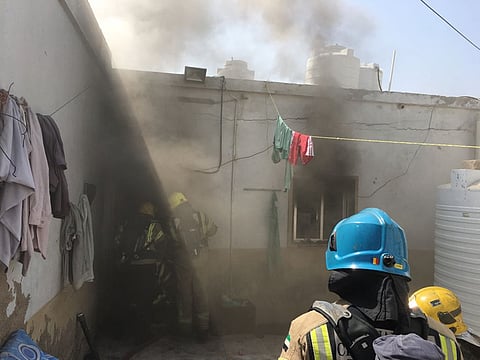Smoke inhalation: emergency steps that can save your life
Specialist talks to Gulf News about the symptoms and first response to smoke inhalation

It takes between just two to 10 minutes for a person to lose consciousness after inhaling toxic smoke from fire, say experts. In fact, statistically speaking, a person is twice as likely to die of smoke inhalation than from burns post a fire, according to the US-based National Fire Protection Association.
Dr Rola Ali-Hassan, Consultant family medicine specialist at Mediclinic Welcare Hospital, talks to Gulf News about the symptoms and first response of smoke inhalation. Plus, what to watch out for if you’ve had a particularly bad exposure.
What is smoke inhalation?
A study published on PubMed states that fire produces a toxic environment with a complex combination of flames, heat, oxygen depletion, smoke and gases such as carbon monoxide and cyanide. The fumes when inhaled can prove fatal.
Symptoms of inhalation
The symptoms of smoke inhalation vary according to age and how much of toxic air, says Dr Ali-Hassan. “Younger children — toddlers, infants — they tend to be a little bit more susceptible; crying [and] uncontrollable a little bit and you can’t tell what’s wrong with them. [While] adults and older children, the first symptom they will notice is a headache. Then they can come down with other symptoms where people may imagine it’s a viral illness, so [there’ll be] body pain, nausea, some dizziness and later on it will progress to other things.”
Treatment
Get the person into fresh air immediately, she recommends. The only treatment is oxygenation, explains Dr Ali-Hassan. “Through a mask or a hospital, they need to be in a place that has higher oxygen levels,” she says.
As far as damage goes, “it all depends on how long you’ve had exposure ... if you’ve had initial carbon monoxide [exposure] and it wasn’t too high and you just had a headache, then it shouldn’t be a problem”.
“If you’ve reached a place where you needed to be intubated, you needed to have some support for the lungs then yes you are at risk of having secondary infections,” she says.
In that case, people should get vaccinated, says Dr Ali-Hassan. “The flu vaccine and the pneumonia vaccine [must be taken]. And it’s hand hygiene that’s going to prevent infections, she says.
Doctor’s notes
If you are pregnant, have a heart or neurological disease, flag it up with your carer after a smoke incident. “Unfortunately, carbon monoxide can cause some neurological and neuropsychic symptoms, so we need to figure out if the patient has a disease linked to these [symptoms] prior or is it secondary to the smoke inhalation,” she explains.
Sign up for the Daily Briefing
Get the latest news and updates straight to your inbox



